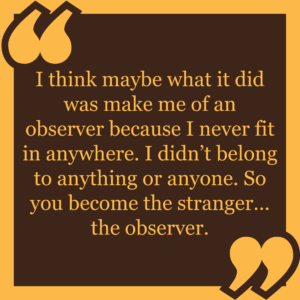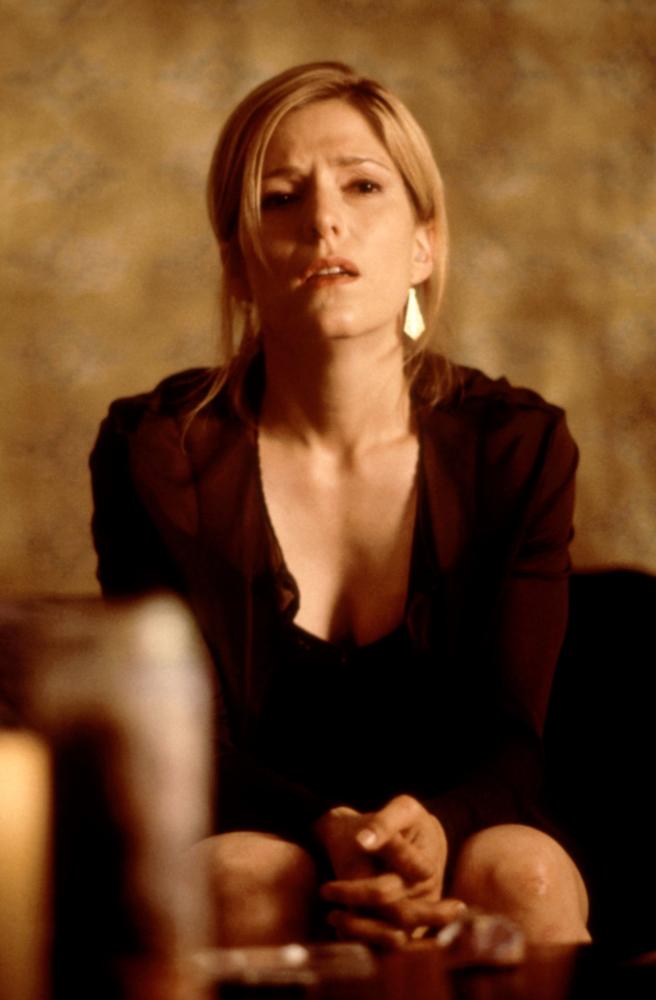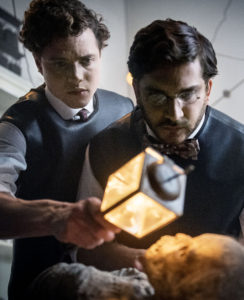
Being a fairly young television enthusiast must be a bit like being a fairly young Boston sports fan… you only know winning! In this Golden Age of TV, the amazing content being pumped into our homes is unlike anything we could have imagined 20 or 30 years ago. Even when something is not your particular cup of tea, it’s hard to argue that it’s not still quality tea.
Such is the case with TNT’s ambitious new series “The Alienist.” Based on the novel by Caleb Carr, the 10-episode crime drama set in 1896 looks and plays like a movie, further advancing the creative maturity of television as a storytelling medium.
We recently sat down with series star Douglas Smith to discuss how he views the small screen awakening, how he approached his performance in “The Alienist,” and the memorable advice Bill Paxton gave him.
TrunkSpace: “The Alienist” is such an ambitious show and certainly reflective of how far television has come in recent years. As an actor working in this Golden Age of TV, is it still exciting to see really high-end storytelling like this being developed or is it kind of expected now?
Smith: I think both. I think audiences have come to expect the best storytelling to unfold on their TVs, but it’s still exciting. I audition for every type of thing. I’m auditioning for indie movies that have no budget. Then next week, I’m auditioning for a sci-fi, CGI thing. I’ve done my fair share of both. I’ve done indies. I’ve done Blumhouse horror movies. I’ve done visual effects-heavy things that are higher budgeted. And so, when you get a chance to work on something that is both well-budgeted, so they can really realize their vision, but it’s also rooted in a gritty, detailed world, you’re able to go into a place that’s maybe not so safe. It’s fun.
I just think people come to expect really great things to show up on their Hulu, or their Netflix, or their Amazon Prime. It’s interesting. Hopefully it keeps going. I hear people wonder what the future will hold, and I don’t think anybody really, truly knows. I know that I definitely waste a lot of hours watching stuff on my various platforms when I should be doing other things ‘cause of how good the stuff is that’s out there. I’m sure you’re the same.
TrunkSpace: Guilty as charged! What’s interesting is that not only do we park ourselves in front of the television way more than we should, but we go into every new show with expectations. There’s a sense of everything needing to be A+ storytelling now.
Smith: Yeah. Well, there’s also this nostalgia side of TV, where you almost expect it to not be that way, and that has a place too. I think that’s why you still see procedurals of the more generic nature still on your television and still getting lots and lots of love from people. I mean, I sometimes feel that way. I sometimes wanna watch that kind of stuff, like “Law & Order” reruns. I’m a huge “Quantum Leap” fan.
TrunkSpace: Great show! Ziggy!
Smith: I discovered that a couple years ago. Sometimes when I can’t sleep, I’ll put on an episode.
TrunkSpace: Imagine what they could do with that show now?
Smith: I would love to see an update, but you have to find an actor with Bakula’s charm. Bakula, he still has the charm. He could definitely be in it, but, he’s busy on “NCIS: New Orleans,” though.
TrunkSpace: Procedurals still have those extended seasons. A 22-episode season tends to have a lot of filler. On something like “The Alienist” where you’re doing a 10-episode season, what’s great about that for the viewer is that every second counts. That must be true for the performer as well?
Smith: Yeah, I would definitely agree with that. I think that you don’t have to retread, and you can really pick your valleys. At least, I did this privately and collaboratively with the different directors that I was working with on the show. We were engaging in a pretty constant conversation… ’cause my character Marcus is very confident and very matter of fact about what they’re doing – kind of cocky and doesn’t seem overly emotional about the killings of the first victims they’re dealing with, as well as the corpses of those five boys who are being analyzed years after their death. That was the way I chose to play it, and that was the way that Jakob (Verbruggen) agreed with. And then moving forward, talking to Max (Frye), one of our writers, we realized that there’s a point where it does go and hit closer to home for Marcus, and we were able to sort of pick that moment a little deeper into the show. It’s around the midpoint of the show.
I was just doing ADR for that scene, and I was really happy with the way it came about. It was like a multi-person dialogue about when does it get too close to home for someone like Marcus, ’cause he grew up in a really dangerous, disgusting neighborhood. I didn’t think it was the right choice for him to be as affected by these grisly murders as somebody like John Moore (played by Luke Evans), who came from a much more sheltered, high society, although I didn’t want to play it like he’s this depressed guy. That wasn’t the vision of the character that was set forth by Caleb Carr in the novel. He was always very strong, and moving forward, especially at the end of the book when Marcus and John go off on their own together, to sort of question people. It’s always John who’s the narrator in the book, who’s reticent and worried, and then Marcus is just like on the side of the building. He’s doing this. He’s doing that. And so, I felt like that was the right move.
When I started reading the scripts as they started coming out, they really kept that. They’d go deeper into Marcus’s home life than the book does, which was also a welcome thing as an actor. Jakob was there throughout the filming of the whole 10 episodes, even though his name is only on the first three. He was actually a shepherd for the whole thing. When I would be working on later episodes, he would still be walking around and he would be shooting something from the earlier episodes later that week, or he’d be in the editing room. We had countless conversations just passing in the hall before I walked into the stage to, let’s say, film a scene from a later episode. “Hey, what do you think about this? Is this right?” Same with Jamie Payne, who directed the last two episodes. He was there the entirety, as well. We were left alone to the point where we could come up with our own ideas, but there was a lot of support to sort of question if those ideas were wrong. There were a few times where the idea was wrong. I remember a pretty specific moment when one of the writers was like, “No, you don’t wanna do that because of this, this, this.” And I was like, “Oh, fuck. You’re right. Okay. Yeah.”
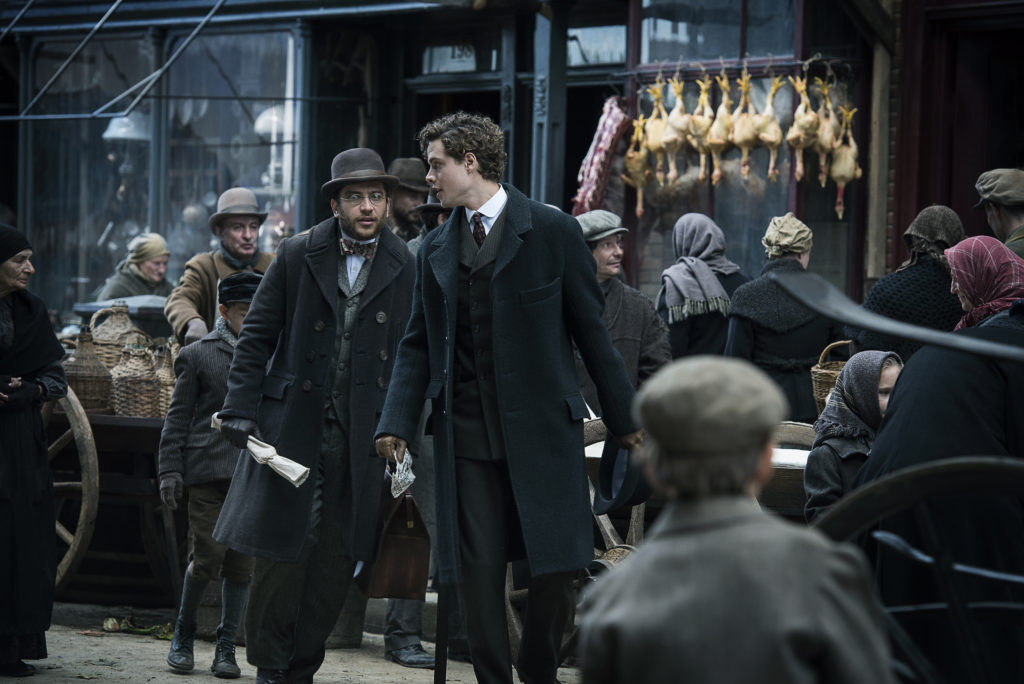
TrunkSpace: Do you approach your performance differently on something like “The Alienist” when you know it is a period piece? Just in terms of how people held themselves, presented themselves, etc.?
Smith: Yeah. That was a long ongoing conversation. The first sort of things were just meeting Matthew (Shear) and being like, “Hey, this is my idea. How did you play it in the audition?” And he’s like, “I kinda did it like this.” And I was like, “All Right. That’s kinda how I did it. We must be on the right track, ’cause we both got cast.” And then, I think the day we landed in Budapest, they had us meet with the dialect coach, Rick Lipton, and we spoke with him. That night we all met at a wine soiree thing, and that was like my first question to Max. Then, we watched some documentaries that sort of analyzed the New York sort of way of life. There was this really great little movie called “Hester Street” that’s kind of about Jews in New York around the turn of the century. It stars that woman from “Annie Hall,” Carol Kane. Then, we watched a documentary called “If These Knishes Could Talk.”
So, we had an ongoing sort of debate. I don’t know if the debate ever really fully ended. We just were like, “Okay, let’s put on the clothes. The clothes are pretty restrictive. Okay. That’ll sort of inform the performance.” But, we didn’t want to be charactery and so stiff, ’cause I really think there’s a malleability and a certain urgency that the Isaacsons bring to the scenes that they populate, and I didn’t really want us to blend in. I don’t think they blend in when I read the pages of either the book or the script. I think they really stand out like sore thumbs in most of the environments that they find themselves in. And so, I wanted to embrace that rather than fight against it.
TrunkSpace: The series plays out like event television in the sense that, you don’t want to wait until it’s all available to stream. You want to show up each week and see what’s going to happen next. Did it have that sense when you first read it?
Smith: I knew it was a week-to-week airing experience, which I know a lot of people like to do. “Stranger Things” came out and most of my friends finished it in a weekend. I’m a little more traditional. I like to spread things out when I like them. I didn’t really think about that though, to be perfectly honest. I kind of knew we were doing a show that was going to be on a network that aired it week after week, and didn’t dump all the episodes at once, but that’s really not a thought that comes into your mindset. I’m there just kinda spending more time talking about what you were talking about, like, “Okay, how do they walk? How do they feel? Like, how many suits do they own?” We sort of decided that the suit you see them in is pretty much the only suit they have. I think we changed outfits once, halfway through, and we’re like, “This is their summer suit.” But they really only own two suits. Even that felt like, “Would they even have two suits?” Maybe. Probably one, maybe two. We were thinking about these kinds of things. And then, thinking about, “How many times have you seen a dead body? How many times have you had sex with a girl? Marcus is not a virgin.” Things like that. “Has Lucius ever had an experience with the opposite sex?” It’s these sort things that you try to focus on, because that’s what’s gonna affect how you do the scene.
I knew we were doing the whole book, which I was happy about. I didn’t think it was the right decision to stretch out the book in more than one season of television. I think that’ll make for a really satisfying experience for people. So, I was happy about that. That’s one thing I didn’t know when I got the job, because I only got the first two scripts when I got the job.
TrunkSpace: You’ve worked on so many projects, and obviously a lot of great television going all the way back to “Big Love.” As an actor, what projects taught you the most about the craft, even though you’re probably still learning on your journey?
Smith: Very much still learning. I learn something on every job. I learn stuff on good and bad jobs. The most valuable thing I ever learned was Bill Paxton telling me not to eat too much before my closeup when they break for lunch in the middle of your scene. It may sound weird, but true. You could spend all day doing your character bio or doing sense memory or something, but we’re sort of practical workmen. Basically he saw me… we were doing a scene, a pretty deep father/son scene. They had to break for lunch after we’d done the master and Bill had done his closeup, but they were saving my closeup. They had to cut for lunch and he saw me piling a huge amount of apple crumble onto my plate. He was like, “Ah, bud…” He sort of did like a little cut gesture. He used to do this kind of cut with his hand across his neck. “I’d cut that out, man. You’re way out of the scene. You know what I’m talking about, brother?”
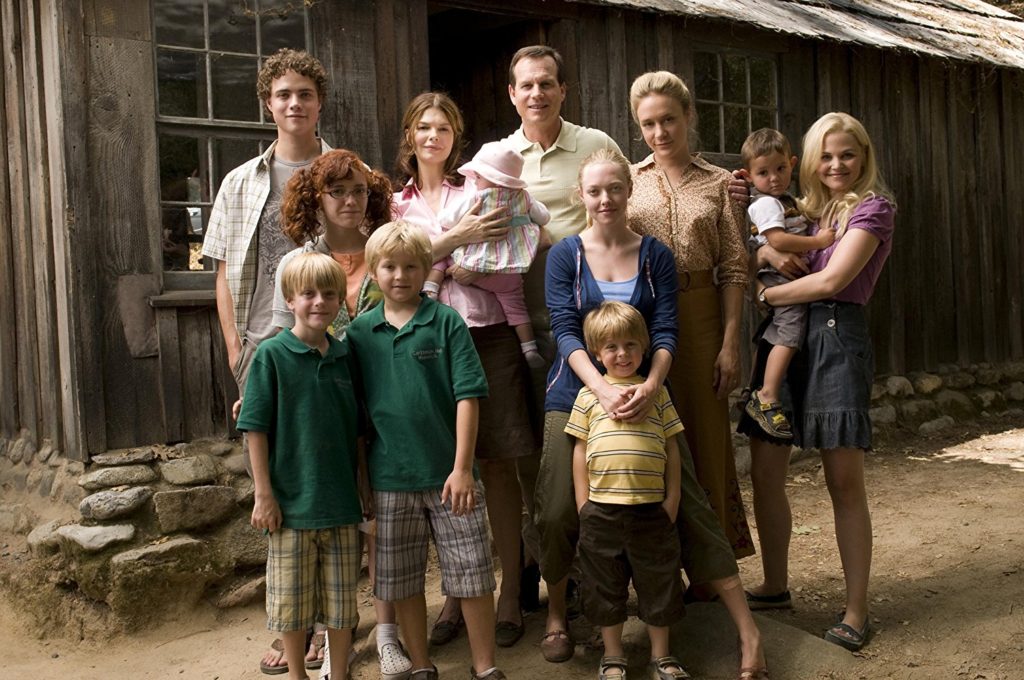
I really always remember that on any job I’ve ever gone on. You do a lot of doing nothing on a set, but you have to be very careful with how you do nothing. You have to be very careful about how you hit the craft service. You have to be very mindful in the way you occupy this body of yours that needs to be ready to perform and access any emotion at any time.
“The Alienist” airs Mondays on TNT.


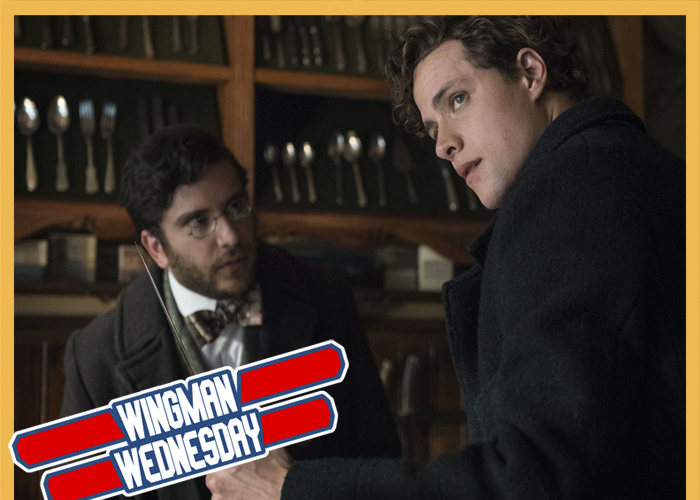
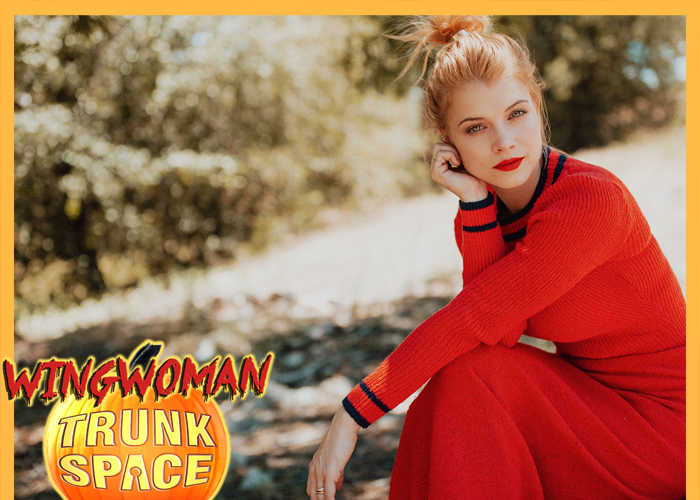
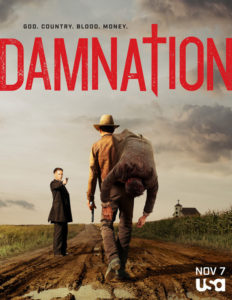 Set in the American heartland during the 1930s, USA Network’s new drama series “Damnation” is prepared to show just how many shades of gray a person can represent at any given moment. Times may change, but human nature does not, which means questionable decision making and life-altering conflict stretches all the way back to the presidential tenure of Franklin Delano Roosevelt. “Damnation” is looking to shine a spotlight on that complicated period in American history, all while taking viewers on a wildly entertaining ride.
Set in the American heartland during the 1930s, USA Network’s new drama series “Damnation” is prepared to show just how many shades of gray a person can represent at any given moment. Times may change, but human nature does not, which means questionable decision making and life-altering conflict stretches all the way back to the presidential tenure of Franklin Delano Roosevelt. “Damnation” is looking to shine a spotlight on that complicated period in American history, all while taking viewers on a wildly entertaining ride.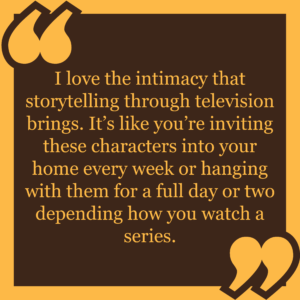 she is inside, but also what that particular period meant to people in terms of how they presented themselves in public and in private – basically, how society influenced who they were?
she is inside, but also what that particular period meant to people in terms of how they presented themselves in public and in private – basically, how society influenced who they were?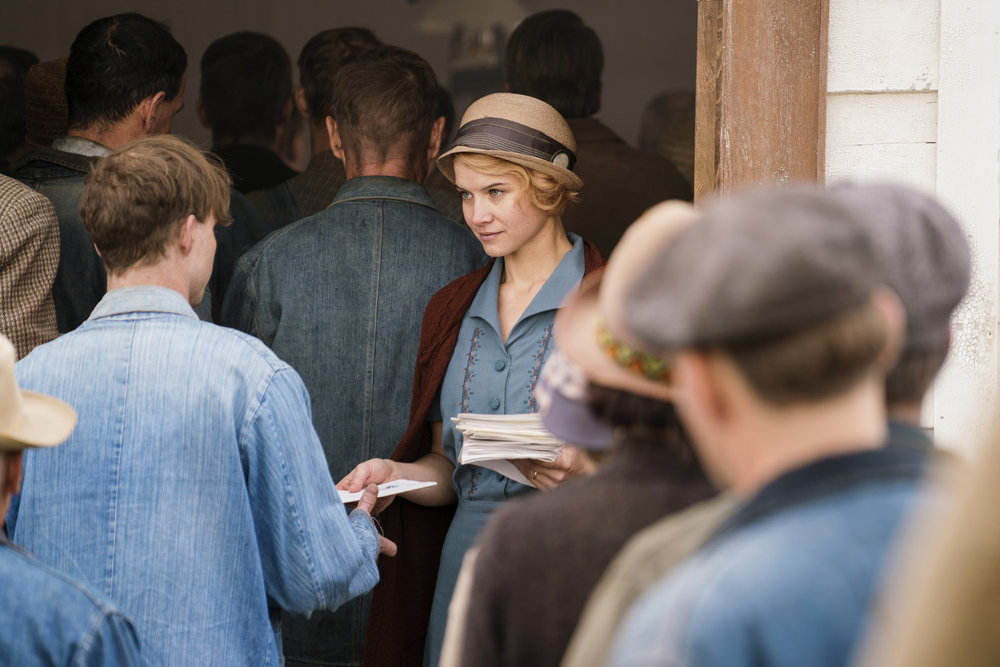
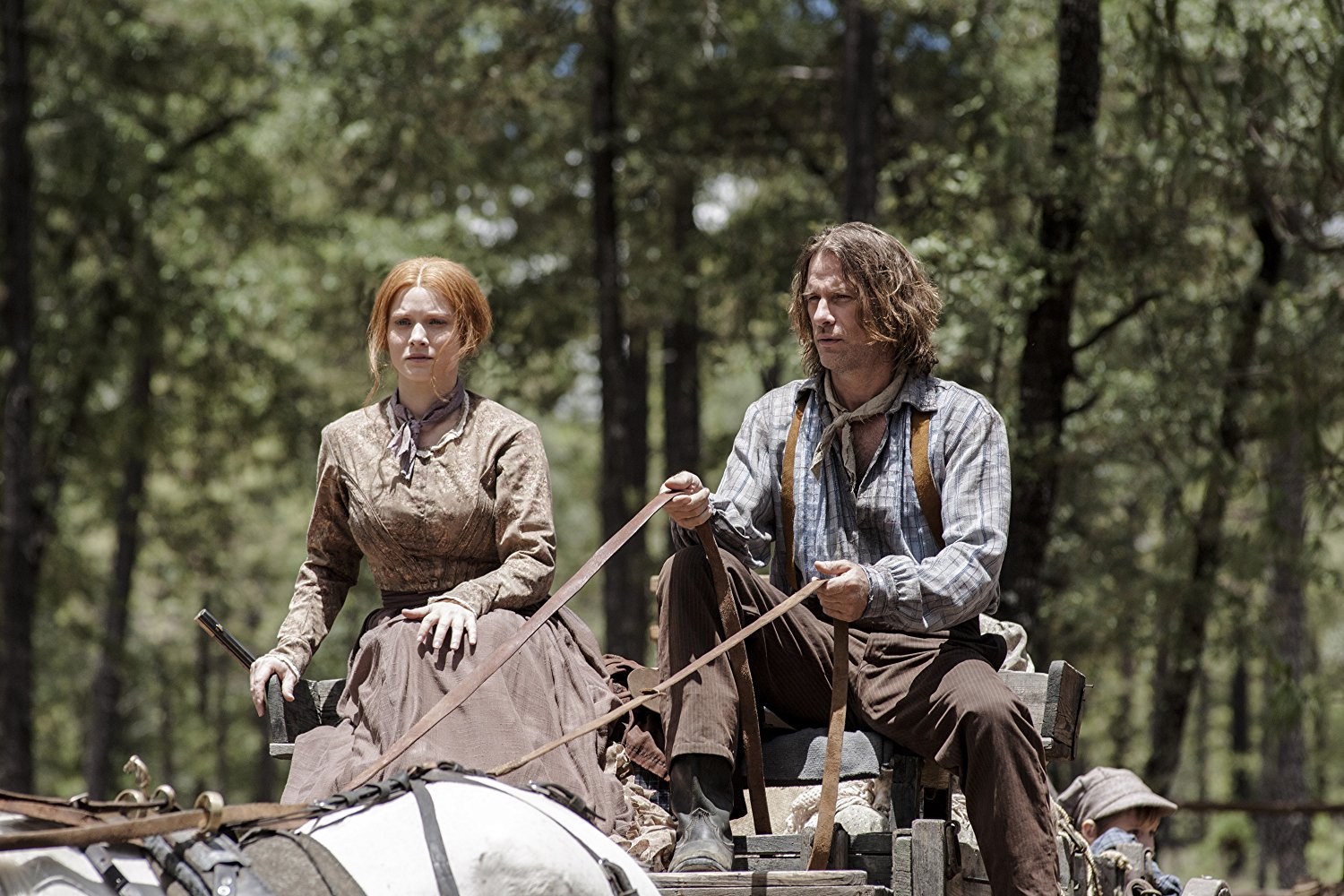
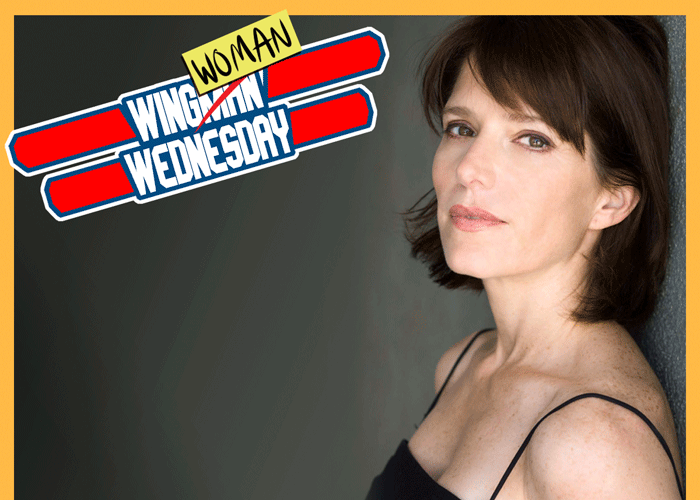
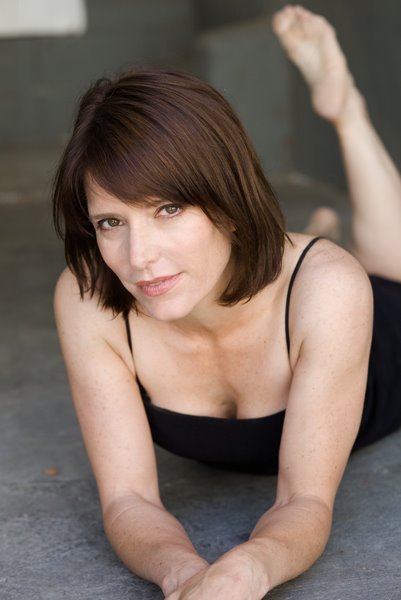 She wowed us in films like “Magnolia” and “Boogie Nights” and kept us glued to the television with her turn as Wanda Henrickson on the HBO series “Big Love.” Now, Melora Walters is taking on the taboo subject of adultery in the new comedy “The Lovers” from writer/director Azazel Jacobs.
She wowed us in films like “Magnolia” and “Boogie Nights” and kept us glued to the television with her turn as Wanda Henrickson on the HBO series “Big Love.” Now, Melora Walters is taking on the taboo subject of adultery in the new comedy “The Lovers” from writer/director Azazel Jacobs.